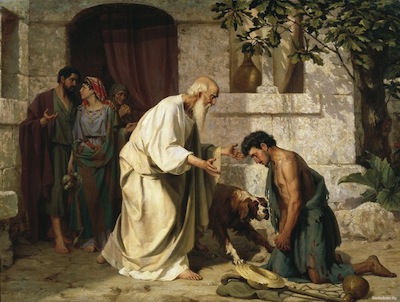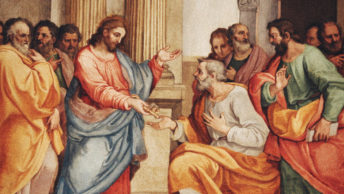 In the Gospel of Luke (15:11-32), we read the ever familiar story of the prodigal son. When we read this story we usually focus our attention on the younger son, on his wayward life and his eventual return. This time, I would like to call your attention to the elder son in the story; and before I tell you why, allow me first to tell you a true story.
In the Gospel of Luke (15:11-32), we read the ever familiar story of the prodigal son. When we read this story we usually focus our attention on the younger son, on his wayward life and his eventual return. This time, I would like to call your attention to the elder son in the story; and before I tell you why, allow me first to tell you a true story.
In years past, I used to minister at the Macomb County Jail. I would go to the prison on an assigned schedule, and while I was there I would conduct a communion service, and visit with the inmates. I no longer do that but I really enjoyed the experience and I sometimes miss it.
While I was at the jail, I would frequently be asked to speak privately with an inmate. And on those occasions, it was very common for the inmate to share the story of their life with me. This was extremely helpful for them because in evaluating their present situation, it was beneficial for them to reflect on their past life with a minister or counselor.
On one occasion, I was asked to speak with a young woman. I would guess her to be in her mid to late twenties. She was awaiting sentencing on a charge of breaking and entering. Her probable sentence was going to be ten to fifteen years. She cried during our entire conversation. During that conversation, she basically told me the story of her life. Her life story had nothing to do with her tears. I will tell you why she was crying a little later.
She said that her mother had died when she was just a baby. Her father had no visible means of support so she was raised by an institution. She went on to say that the institution had judged her to be unintelligent, that she was not smart enough to learn certain skills, so she was given just a basic education. Now as an adult she could neither read nor write. Her father did not have custody but he did have visitation privilege. As she grew older, her father was allowed to take her from the institution for a day or a weekend at a time. And when she was thirteen years old, her father began to teach her things that no thirteen year old girl should know. When she was old enough to leave the institution, she was unemployable, so she made a living doing what her father had taught her. She became a prostitute. That was her profession. That is how she survived.
She eventually met a customer who said that he would support her so that she would not have to make a living that way anymore. But he also was unemployable, so they survived by stealing. And that was why she was in prison. They were both arrested for breaking and entering and for grand larceny. Having been a prostitute for all those years, she had a long police record. And since she is classified in the judicial system as a repeat offender, she had every reason to expect the maximum sentence of ten to fifteen years. The inevitable sentence didn’t bother her. For her, life was the pits. Inside or outside made no difference to her.
As I said, she cried all the while we spoke. She said, “I am crying because when I was picked up, they went to my apartment and also picked up my dog. I am crying because I am afraid for my dog. What will happen to my dog? People here laugh at me when I cry for my dog, but I have to cry for my dog. That dog is the only living creature who ever showed me love and affection unconditionally. That dog is the only living creature who loved me in spite of who and what I am.”
Her story touched me deeply. All I could think of, as she shared her story with me, was that either she had never met a Christian, or else we Christians are not doing a very good job.
The elder son in Luke’s Gospel could not rejoice with his father over the return of his younger brother. Why? Was it sibling rivalry that prevented him from also rejoicing? I think not. The parable makes it clear that it was self-righteousness that caused such animosity toward his sinful younger brother. “Look, all these years I served you and not once did I disobey your orders; yet you never gave me even a young goat to feast on with my friends.” Jesus obviously told this parable to communicate a truth. Who do you think that Jesus meant this elder brother to represent? Who do you know that would hold such animosity toward a sinner that they could not rejoice when the sinner repents? Each and every one of us must look within ourselves as we ponder the answer to that question. Because whoever Jesus meant the elder brother to represent, the question remains for each one of us to consider.
Please do not misunderstand me. I am not trying to bring acceptance to this young lady’s career choice. But we need to ask ourselves, whose sin is it? Was it her sin, or her father’s, or the institution’s? In other words, we must not be judgmental or self-righteous. Jesus portrays our God as being compassionate, loving and eager to forgive. Our job, our only job in life, the ultimate purpose of our life, is to learn to perfect the art of loving unconditionally. And as we perfect the art of loving unconditionally, we are to allow the love of God to shine brightly through our lives, to illuminate the way for others to follow.









Every man or woman is precious before God
Even as a currency note ,whether in fresh or soiled state
Retains its value before men and women
Human life is so precious as said in Psalm 49,
And no human can make good for the loss of it